
Tulu’s flagship AI assistant is imagined as a real-world Iron Man’s Jarvis a responsive, proactive guide that helps, informs, and empowers patients and caregivers 24*7.
Dr. Adil Khan: Coding Compassion into Every Care Journey
In a system often overshadowed by bureaucracy, complexity, and disconnected care, Dr. Adil Khan emerges as a rare force blending empathy with innovation. A doctor by training, innovator by passion, and founder of Tulu Health—India’s first healthcare AI Agent platform—Dr. Khan is on a mission to build a patient-first ecosystem that is accessible, empathetic, and financially transparent.
Whether it was co-creating life-saving devices like Yoddha Kawach at AIIMS & IIT Delhi, leading digital transformation across 150+ hospitals, or building an intelligent healthcare interface that bridges gaps in the patient journey, every step in Dr. Khan’s career is guided by a deeply personal promise—to ensure that no patient feels alone or underserved.
The Core Philosophy: Innovation That Begins with Real Patient Pain Points
At the heart of Dr. Khan’s vision lies a powerful mantra: “Care should reach the patient, not the other way around.” For him, true innovation doesn’t begin with optimizing systems; it begins with listening deeply, empathetically, to the needs of real people navigating their most vulnerable moments.
In a healthcare landscape cluttered with complex apps, fragmented touchpoints, and impersonal jargon, his approach stands out: combine empathy with data, insight with accessibility, and technology with trust.
The Spark Behind the Mission: A Grandfather’s Struggle
Dr. Khan’s philosophy was born from a personal and profound experience—watching his grandfather struggle through a system that often overlooked the human behind the illness. Witnessing the confusion, fear, and helplessness patients faced—even after receiving medical care—sparked a deep commitment to redefine the patient experience.
From the frontlines of rural COVID wards to digital health design labs, he has seen that patient-centered care is not just a good idea—it’s a moral imperative.
The Vision Ahead: A Healthcare Journey Without Fear or Confusion
At Tulu Health, Dr. Khan is engineering a future where no patient is left to navigate the system alone. His goal? To create a seamless journey from discovery to recovery, where care is not just intelligent and AI-powered—but also emotionally aware and financially supportive.
Tulu’s flagship AI assistant is imagined as a real-world “Jarvis”—a responsive, proactive guide that helps, informs, and empowers patients and caregivers 24/7.
On VOH and the Power of Human-Centric Platforms
“VOH doesn’t just talk about numbers or technologies—it shares the real human journeys behind the headlines,” says Dr. Khan. In a time when healthcare transformation is accelerating, platforms like Voice of Healthcare are crucial in ensuring that the human story stays at the center of the conversation. By showcasing leaders who dare to challenge the status quo, the Idea Leader series inspires a more compassionate, inclusive, and innovative future for healthcare.
Recent
Tulu’s flagship AI assistant is imagined as a real-world Iron Man’s Jarvis a responsive, proactive guide that helps, informs, and empowers patients and caregivers 24*7.
Dr. Adil Khan: Coding Compassion into Every Care Journey
In a system often overshadowed by bureaucracy, complexity, and disconnected care, Dr. Adil Khan emerges as a rare force blending empathy with innovation. A doctor by training, innovator by passion, and founder of Tulu Health—India’s first healthcare AI Agent platform—Dr. Khan is on a mission to build a patient-first ecosystem that is accessible, empathetic, and financially transparent.
Whether it was co-creating life-saving devices like Yoddha Kawach at AIIMS & IIT Delhi, leading digital transformation across 150+ hospitals, or building an intelligent healthcare interface that bridges gaps in the patient journey, every step in Dr. Khan’s career is guided by a deeply personal promise—to ensure that no patient feels alone or underserved.
The Core Philosophy: Innovation That Begins with Real Patient Pain Points
At the heart of Dr. Khan’s vision lies a powerful mantra: “Care should reach the patient, not the other way around.” For him, true innovation doesn’t begin with optimizing systems; it begins with listening deeply, empathetically, to the needs of real people navigating their most vulnerable moments.
In a healthcare landscape cluttered with complex apps, fragmented touchpoints, and impersonal jargon, his approach stands out: combine empathy with data, insight with accessibility, and technology with trust.
The Spark Behind the Mission: A Grandfather’s Struggle
Dr. Khan’s philosophy was born from a personal and profound experience—watching his grandfather struggle through a system that often overlooked the human behind the illness. Witnessing the confusion, fear, and helplessness patients faced—even after receiving medical care—sparked a deep commitment to redefine the patient experience.
From the frontlines of rural COVID wards to digital health design labs, he has seen that patient-centered care is not just a good idea—it’s a moral imperative.
The Vision Ahead: A Healthcare Journey Without Fear or Confusion
At Tulu Health, Dr. Khan is engineering a future where no patient is left to navigate the system alone. His goal? To create a seamless journey from discovery to recovery, where care is not just intelligent and AI-powered—but also emotionally aware and financially supportive.
Tulu’s flagship AI assistant is imagined as a real-world “Jarvis”—a responsive, proactive guide that helps, informs, and empowers patients and caregivers 24/7.
On VOH and the Power of Human-Centric Platforms
“VOH doesn’t just talk about numbers or technologies—it shares the real human journeys behind the headlines,” says Dr. Khan. In a time when healthcare transformation is accelerating, platforms like Voice of Healthcare are crucial in ensuring that the human story stays at the center of the conversation. By showcasing leaders who dare to challenge the status quo, the Idea Leader series inspires a more compassionate, inclusive, and innovative future for healthcare.
International Women’s Day 2025: 30 Women Driving Change in Healthcare
International Women’s Day 2025: 30 Women Driving Change in Healthcare
1. Visalakshi Chandramouli, Managing Partner, Tata Capital Healthcare Fund
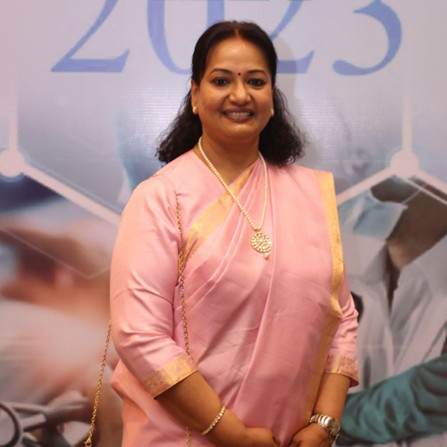
Visalakshi, Founding Partner of Tata Capital Healthcare Fund, is a trailblazer in healthcare investment. With nearly 30 years of experience, she has led $250M+ in investments, shaped industry policies, and earned multiple accolades for her impact on healthcare and finance.
Visalakshi is the Founding Partner of Tata Capital Healthcare Fund, an India dedicated Healthcare & Life Sciences Private Equity Fund. With nearly three decades of expertise spanning private equity, equity research, and pharmaceutical R&D, she has played a pivotal role in shaping the industry.
As head of the Tata Capital Healthcare Fund, Visalakshi has successfully led the fundraise in both vintages of the Tata Capital Healthcare Funds (I and II), with investor commitments and co-investments of ~USD 250MN from global and domestic investors. Under her leadership, the fund has consistently delivered strong returns, earning accolades such as ‘Healthcare Investor of the Year’ for consecutively three years (2018-2020) and ‘Healthcare Leadership Award’ (2022). She is actively involved with portfolio companies, serving on their boards and governance committees.
Visalakshi started her career as a research scientist at Cipla before transitioning to investment research at Kotak Securities and Merrill Lynch where she was rated among top 2 in Asia for Healthcare on the prestigious Institutional Investor poll rankings. Recognized among India’s Top 100 Women in Finance (2020), she also co-authored India’s first Impact Assessment Standards and Framework. Apart from her education as Chemical Technologist from ICT Mumbai and MBA from Mumbai University, Visalakshi is also a graduate in Advanced Management Program (AMP) from the Harvard Business School where she further honed her leadership skills. As part of NATHEALTH’s leadership team, she continues to influence national healthcare policy, cementing her legacy as one of India's most influential women in finance and healthcare.
2. Neerja Birla, Founder and Chairperson, Aditya Birla Education Trust

A passionate educator and mental health advocate, Neerja Birla leads the Aditya Birla Education Trust, transforming education and mental health in India. Through Mpower and Ujaas, she fights stigma and empowers communities.
Neerja Birla is a dedicated educator, mental health advocate, and philanthropist. She is the Founder and Chairperson of the Aditya Birla Education Trust (ABET), an organization committed to driving positive change in education and mental health in India. Under her leadership, ABET has launched several initiatives, Mpower and Ujaas, aiming to reduce the stigma around mental health and menstrual health. Neerja holds an Honors Bachelor's degree in Psychology from the University of Derby.
3. Padma Bhushan, Suchitra Ella, Co-Founder & Managing Director, Bharat Biotech
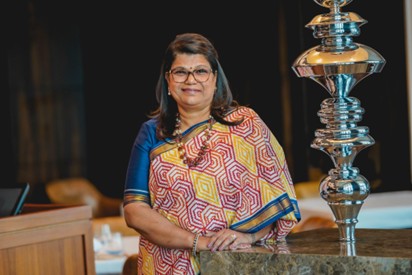
Co-Founder & MD of Bharat Biotech, Suchitra Ella is a pioneer in vaccine innovation, leading breakthroughs like COVAXIN® and iNCOVACC®. A global health trailblazer and advocate for gender inclusivity.
Suchitra Ella, a first-generation entrepreneur, is the Co-Founder and Managing Director of Bharat Biotech, a global leader in vaccine innovation. With a vision to develop affordable and innovative healthcare solutions, she played a crucial role in the company’s success, delivering over 9 billion vaccine doses across 125+ countries through UNICEF, GAVI, and other global health organizations. Under her leadership, Bharat Biotech has pioneered several breakthrough vaccines, including COVAXIN®, India’s first indigenous COVID-19 vaccine, and iNCOVACC®, the world’s first intranasal COVID-19 vaccine. The company has also introduced HILLCHOL®, addressing the global cholera vaccine shortage.
Beyond biotechnology, she has co-founded multiple enterprises spanning human and animal health, food, and agriculture. Her contributions to the industry have been widely recognized, including the prestigious Padma Bhushan in 2022. A strong advocate for gender inclusivity and skill development, she actively supports education, healthcare, and cultural heritage initiatives, inspiring women in healthcare and beyond.
4. Padma Shri Prof. Dr. Kamini A. Rao, Co-Founder & Chairperson, Medline Academics, Co-Founder, Medical Director – Dr. Kamini Rao Hospitals (A unit of Medline Academics Pvt. Ltd.)
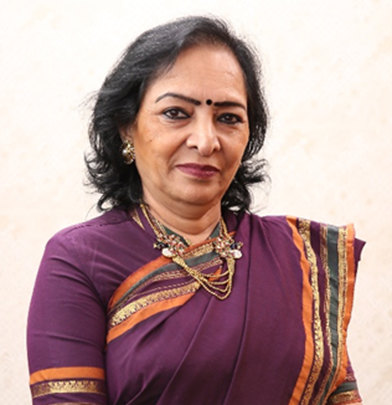
A pioneer in reproductive medicine, Dr. Kamini Rao revolutionized IVF in India. Awarded the Padma Shri, she continues to inspire with her medical innovations and mentorship
Padma Shri Prof. Dr. Kamini A. Rao is a globally renowned expert in reproductive medicine and assisted reproductive technology (ART), pioneering several breakthroughs in India’s fertility landscape. She has been instrumental in advancing IVF, high-risk obstetrics, reproductive endocrinology, and genetics. She was a key contributor to India's first SIFT baby and first baby born through laser-assisted hatching, setting new benchmarks in ART.
With prestigious qualifications including FRCOG (UK), FICOG, D.Sc, and FNAMS, she has earned numerous accolades, including the Padma Shri (2014) for her exceptional contributions to healthcare, Lifetime Achievement Awards from FOGSI, ISAR, Karnataka Vaidya Ratna Award, and many more. Beyond clinical excellence, she is a passionate educator, mentor, and advocate for ethical medical practices, having trained numerous specialists in reproductive medicine. Dr. Rao’s influence extends beyond medical practice into policy-making, research, and awareness-building, making her a true trailblazer in
reproductive healthcare.
5. Dr. Gagandeep Kang, Director-Enterics, Diagnostics, Genomics and Epidemiology, Global Health, Gates Foundation
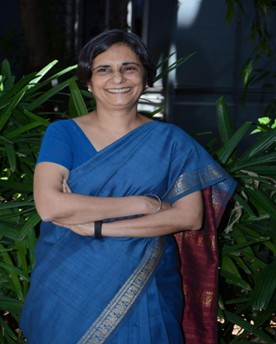
Dr. Gagandeep Kang is a virologist known for her work on rotavirus vaccines and for understanding the epidemiology and prevention of enteric diseases. She was the first Indian woman elected as a Fellow of the Royal Society in 2019. She received the John Dirks Gairdner Award in Global Health
Dr. Gagandeep Kang is a distinguished Indian virologist and microbiologist renowned for her groundbreaking work on infectious diseases. A graduate of Christian Medical College, Vellore, she earned her MBBS, MD, and PhD, she did postdoctoral research in the UK and the US before returning to India. In 2019, she became the first Indian woman elected as a Fellow of the Royal Society and in 2024, she received the John Dirks Gairdner Award in Global Health. She made significant contributions to understanding the epidemiology and prevention of enteric diseases, particularly in children, and led pivotal research on enteric infections, sanitation, and vaccines contributing to both India’s indigenous rotavirus vaccines, Rotavac and Rotasiil.
6. Dr. Tarang Gianchandani, CEO, Sir H. N. Reliance Foundation Hospital
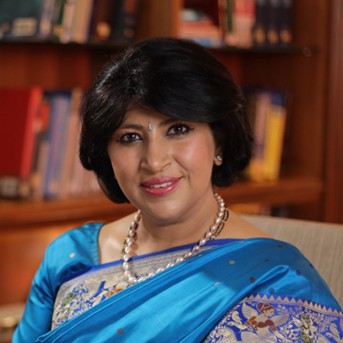
CEO of Sir H. N. Reliance Foundation Hospital, Dr. Tarang Gianchandani is a healthcare visionary. With over 25 years of experience, she pioneers patient-centric, technology-driven healthcare excellence.
With over 25 years of experience in India and Singapore, Dr. Tarang Gianchandani is a renowned healthcare leader, orthopedic surgeon, and administrator. An MBA in Healthcare Management graduate, she has led top hospitals and shaped healthcare policies. A recipient of multiple leadership awards, she advocates for technology-driven, process-oriented, and patient-centric care, ensuring sustainable healthcare systems that prioritize quality, clinical excellence, and exceptional patient experiences.
7. Dr. Swati Piramal, Vice Chairperson, Piramal Group
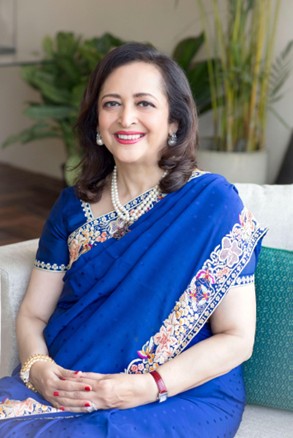
Dr. Swati Piramal is one of India’s leading scientists and industrialists and is involved in public health and innovation. She serves as Director of Piramal Enterprises and the Piramal Foundation
Dr. Swati Piramal has used her background in medicine, public health, and business to change the trajectory of healthcare, education, and public policy in India. She is one of India’s leading scientists and industrialists and is involved in public health and innovation. Dr. Piramal earned her medical degree from Mumbai University. Dr Piramal is an alumnus of the Harvard School of Public Health. She is the Director of Piramal Foundation, the philanthropic arm of Piramal Group where she helps promote health in rural India with mobile health services, women’s empowerment projects, and supporting community education that creates young leaders. As the first woman president of India’s Apex Chamber of Commerce (ASSOCHAM), in 90 years, she helped influence important public policies and governance. She has also been a member or held board positions in Indian Government including Prime Minister’s Trade Advisory Council, Prime Minister’s Scientific Advisory Council, Governing Body of Council of Scientific & Industrial Research and many others.
8. Namita Thapar, Executive, Director, Emcure Pharmaceuticals

An inspiring leader at Emcure Pharmaceuticals, Namita Thapar empowers entrepreneurs, advocates for women's health, and mentors young minds. Known for her role on Shark Tank India, she champions innovation and impact
Namita Thapar is the Whole-time Director of Emcure Pharmaceuticals managing Emcure’s India Business. She is an MBA graduate from the Fuqua School of Business and a Chartered Accountant from ICAI. Post her successful 6-year stint at Guidant Corporation, USA, Namita joined Emcure as CFO and subsequently, her responsibilities grew to include Emcure’s India Business as well. A recipient of numerous prestigious corporate accolades, she has been recognized with The Economic Times ‘40 Under Forty’ award, Barclays Hurun Next Gen Leader recognition, Economic Times Women Ahead List (2017), and Business Today’s Women of Power (2021, 2022, 2023). She was also featured in Forbes Asia’s Power Businesswomen list in 2022. She is known for her role as a 'shark' on Shark Tank India, where she supports and mentors budding entrepreneurs. She also runs an entrepreneurship academy for teens and spreads awareness about Women's Health through a unique YouTube talk show called Unconditional Yourself with Namita.
9. Ameera Shah, Promoter and Executive Chairperson, Metropolis Healthcare Limited
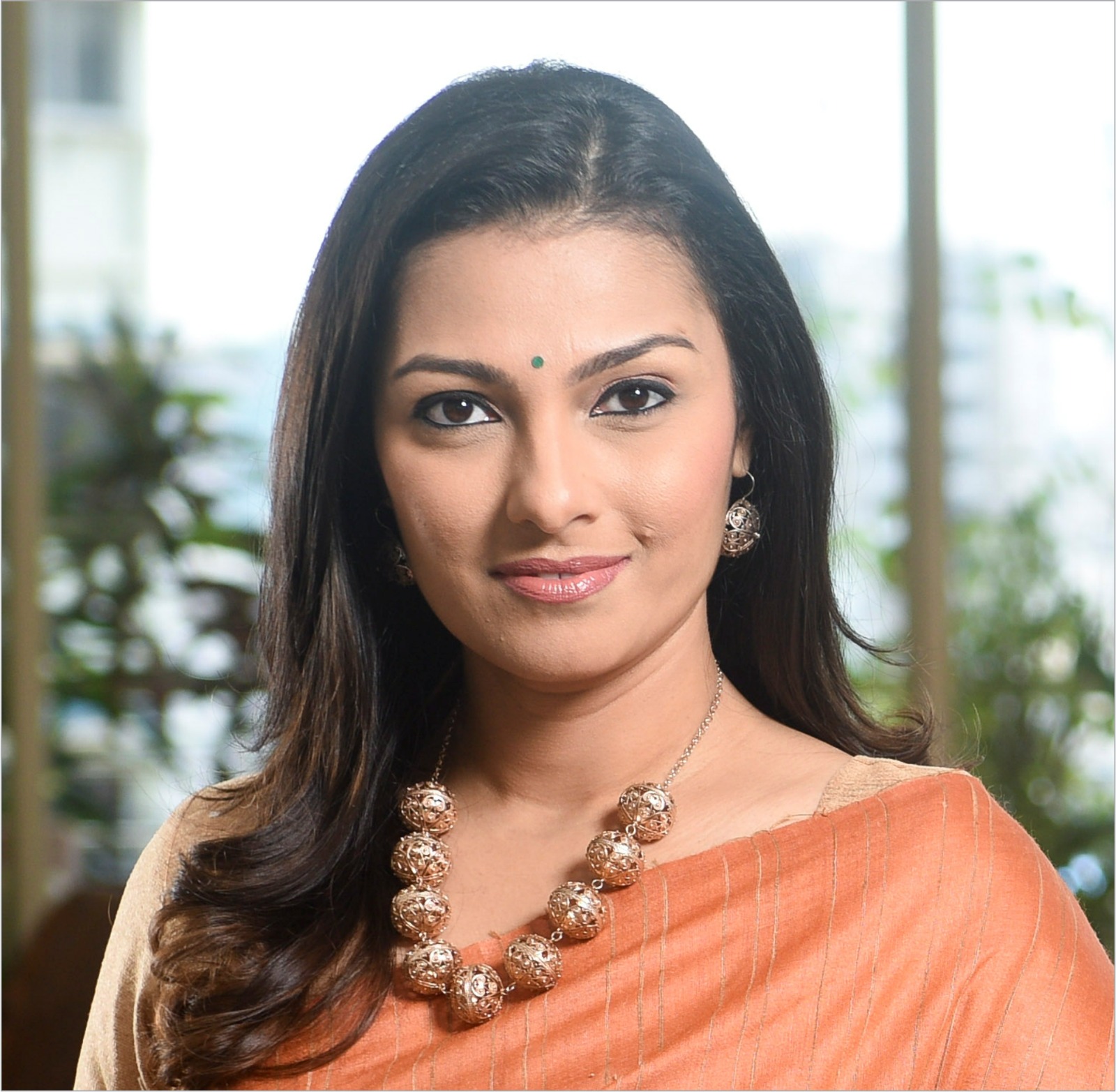
From growing Metropolis Healthcare into a diagnostics giant to shaping healthcare policy, Ameera Shah is redefining diagnostics in India and Africa. A thought leader, investor favorite, and industry icon.
Ameera Shah is a visionary leader who has transformed Metropolis Healthcare into the second-largest diagnostic chain in India and Africa. Under her leadership, Metropolis has become a trusted scientific brand, operating in over 700 towns and serving millions annually. Over two decades, she has driven the company’s growth, securing three rounds of private equity funding and taking it public in 2019, delivering strong investor returns and industry-leading performance.
Her achievements include the Ernst & Young ‘Entrepreneur of the Year’ Award in Healthcare (2021). Forbes Asia, Fortune India, and Business Today have featured her among the Most Powerful Women in Business. A recognized thought leader, she serves on corporate boards, advises global institutions, and has held senior roles in key industry bodies shaping healthcare policy. She currently serves as Sr. Vice-President of NATHealth (Healthcare Federation of India) and will take over as President from April 1, 2025.
10. Anjali Ajai Kumar, Executive Director, Strategy, HealthCare Global Enterprises Limited (HCG)

Anjali Ajaikumar oversees 26 HCG cancer centers and leads humanitarian projects through the HCG Foundation. She co-founded Lumos Health to support global healthcare startups and is a trustee at Bharath Hospital, focusing on cancer care.
Anjali Ajaikumar has been instrumental in shaping the strategic growth of HealthCare Global Enterprises (HCG), playing a key role in its expansion from a handful of centers to a nationwide network. As Executive Director she has been deeply involved in optimizing internal operations, enhancing patient-centric care, and driving organizational efficiency across HCG’s 26 cancer centers.
Beyond this, Anjali is dedicated to making quality cancer care accessible to all. She plays a pivotal role in the HCG Foundation, which provides financial assistance, treatment support, and awareness programs for medically underserved cancer patients. Through the foundation, she has led multiple fundraising initiatives, cancer screening drives, and community outreach programs, ensuring that life-saving treatment reaches those in need. She also serves as a trustee at Bharath Hospital Mysore, focusing on strengthening cancer care services.
As a co-founder of Lumos Health Advisory, Anjali supports global healthcare startups, fostering innovation in patient care and medical technology. With an MBA in Entrepreneurship from Babson College and an unwavering passion for transformative healthcare solutions, Anjali continues to drive meaningful impact - bridging the gap between innovation and accessibility in the world of healthcare.
11. Dr. P. Vijaya, President-Elect, Indian Stroke Association (ISA), Fellow World Stroke Organization, Director Ankineedu Advanced Stroke Center, Lalitha Group of Hospitals, Guntur, AP
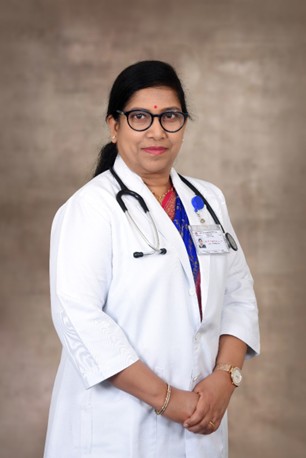
President-Elect of the Indian Stroke Association, Dr. P. Vijaya is revolutionizing stroke care in India. A leading neurologist, educator, and policy advocate, she’s shaping better patient outcomes.
Dr. P. Vijaya is a renowned neuroscientist, astute Clinician, Teacher, Academician, public educationist and a strong advocate for standardized stroke care and accreditation processes in India. As the President-Elect of the Indian Stroke Association (ISA), she is dedicated to improving stroke management and patient outcomes nationwide. An alumnus of PGIMER, Chandigarh, Dr. Vijaya has an illustrious academic record, earning multiple gold medals, including for Best Outgoing Student in MBBS and topping her MD (General Medicine) batch in 1987. She completed her DM in Neurology in 1990 and has since made significant contributions to stroke research and treatment. As Invited faculty at National & International conferences and over 60 publications in leading journals, Dr. Vijaya plays a crucial role in shaping stroke care policies. As an Executive Committee Member of ISA, she continues to work towards strengthening India’s stroke care infrastructure, ensuring equitable access to high-quality treatment and better patient outcomes.
12. Tanya Julka, Head of Marketing, Roche Diagnostics India and Neighbouring Markets

Tanya Julka is the Head of Marketing at Roche Diagnostics India and Neighbouring markets where she spearheads initiatives to advance diagnostic solutions for critical diseases, including cardiometabolic, women’s health, oncology, neurology, infectious diseases, blood safety and point of care solutions along with market insights and customer experience and value creation.
She has been instrumental in driving key marketing campaigns for awareness, accessibility, and innovation in diagnostics, ensuring early detection and improved patient outcomes. Tanya is known for her expertise in first in diagnostics and first in healthcare ‘Phy-gital’ initiatives in market shaping and patient-centric strategies co-created with some of the key national lab chains and hospitals in India. A passionate advocate for equitable healthcare and diversity and inclusion, she is recognized for leading cutting edge new launches to transform diagnostics to address India’s evolving healthcare challenges.
13. Dr. Monika Puri, Roche Pharma India, Chief Country Access & Policy Officer, Roche Pharma India
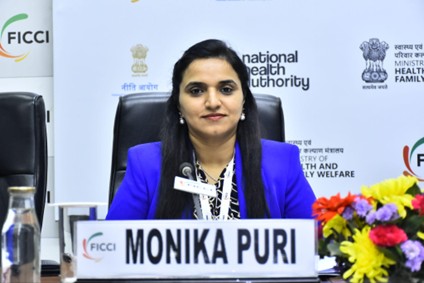
Dr. Monika Puri, a public health specialist with 15+ years of experience, is committed to advancing affordable healthcare access. A Chevening Scholar and B20 Taskforce member, she champions public-private partnerships in healthcare innovation and policy at Roche Pharma India.
A medical doctor and a trained public health specialist, Dr. Monika Puri has 15+ years of experience advancing affordable healthcare access. Before returning to India, she played a pivotal role at Roche HQ in Switzerland, collaborating with WHO, UN, and G20 bodies to advance on building sustainable healthcare systems. Previously with WHO-SEARO, she has worked in assisting member countries on health systems strengthening, policy shaping, and universal health coverage. A Chevening Scholar, she is a B20 Taskforce member , Global Ambassador of G20 & G7 Health & Development Partnership ) and a global advocate for public-private partnerships in healthcare innovation and policy.
Dr. Monika Puri advances affordable healthcare access at Roche Pharma India. She has expertise in health systems strengthening and global health policy.
14. Arushi Jain, Director of Akums Drugs & Pharmaceuticals
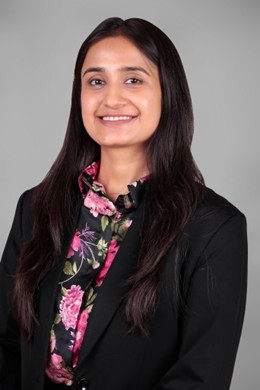
As Director at Akums Drugs & Pharmaceuticals, Arushi Jain drives strategic growth, digital transformation, and operational excellence. A Chartered Accountant, she blends financial expertise with innovation, reshaping India’s pharmaceutical landscape.
Arushi Jain serves as the Director of Akums Drugs & Pharmaceuticals, a leading contract-manufacturing pharmaceutical company in India. A Chartered Accountant with deep financial expertise and marketing acumen, she is positioned to drive strategic leadership at Akums. Arushi has contributed to strengthening the company’s market position through process management, streamlined operations, and a focus on digital transformation, consistently redefining success and steering growth in today’s competitive markets.
15. Dr Sunita Tandulwadkar, President of FOGSI (Federation of Obstetric and Gynaecological Societies of India)

President of FOGSI, Dr. Sunita Tandulwadkar leads with innovation in obstetrics, gynecology, and IVF. A pioneer in reproductive health, she empowers gynecologists and uplifts women's healthcare nationwide.
Dr Sunita Tandulwadkar is the President of FOGSI - one of the largest membership based national organization of specialized professionals in India.
Like a modern-day Devi with eight hands, she masterfully balances the art and science of medicine—one hand wielding the scalpel in endoscopy, another delivering miracles in obstetrics, yet another guiding fertility dreams to reality through IVF. She is the chief of Ruby Hall Clinic IVF and endoscopy center, Founder & Medical director at Solo Clinic & ALIV - A stem cell research and application centre, Pune. A true embodiment of the belief that you are defined not by what you achieve, but by what you give back to society, she has devoted herself to uplifting women’s healthcare, empowering 46,000 gynecologists, and pioneering change across the nation. Aaroga Yoga Yatra, Gyan Pravaah, Gyaan Deepika, Sampoorna, Know your numbers, FOGSI Anubandha, to name a few. Some leaders command with authority; others lead with inspiration. And then there are a rare few who do both—with grace, wisdom, and a steadfast commitment for the greater good.
16. Meenakshi Nevatia, Country President & Managing Director, Pfizer India
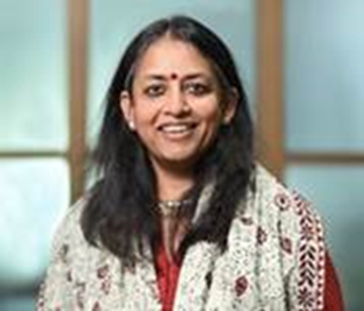
Country President & MD of Pfizer India, Meenakshi Nevatia blends global leadership experience with a vision for healthcare transformation. A trailblazer in pharma and medtech.
Prior to joining Pfizer, Meenakshi has been the Managing Director for Stryker India. Stryker is a leading Medical Technology business. Meenakshi was responsible for building Stryker’s business strategy and setting up the organization for long-term, sustainable growth in the Indian market. Additionally, one of Meenakshi’s priorities was to build a winning culture and cultivate a strong commitment to Stryker’s mission and values in India. Meenakshi was on the Board of the Medical Technology Association of India (MTAI), in the Governing Council of Nathealth and CII (Confederation of Indian Industry) and was the Co-Chair of the Med Tech Committee at AMCHAM (American Chamber of Commerce).
Prior to joining Stryker, Meenakshi had a successful 15-year stint with Novartis, where she served in various sales, marketing and business leadership positions across geographies. In her last assignment as the country president and pharma division head for Novartis in Thailand, Meenakshi successfully led strong business performance. Prior to these roles, Meenakshi had a successful track record of serving in various leadership positions in country, region and global at Novartis across Spain, Portugal, UK, Switzerland & Hong Kong.
Meenakshi started her career with McKinsey & Company where she led various projects in the Healthcare Practice (Pharmaceuticals, Medical Devices & Health Insurance) across several markets including India, Singapore, U.S. and South Africa.
Meenakshi has a Master of Business Administration in Strategy and Finance from the Indian Institute of Management, Ahmedabad (IIM A), and Bachelor of Science in Economics and Mathematics from the Presidency College, Kolkata.
17. Dr. Upasana Arora, Managing Director, Yashoda Super Speciality Hospital, Ghaziabad
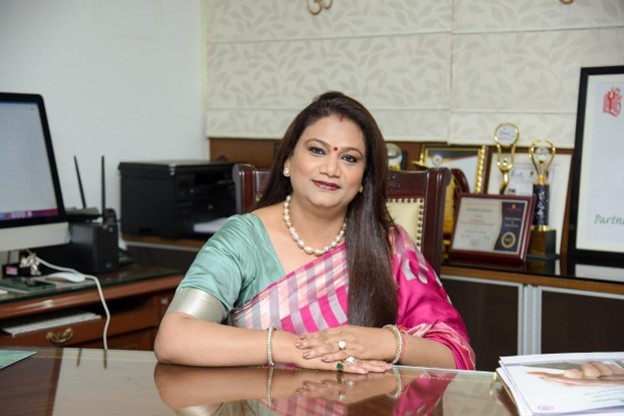
As MD of Yashoda Super Speciality Hospitals, Dr. Upasana Arora is dedicated to ethical, accessible healthcare. A leader in medical policy, she champions patient rights and safety.
Dr. Upasana Arora is a visionary healthcare leader and Group Managing Director of Yashoda Super Speciality Hospitals. An alumna of Harvard Medical School and IIM Ahmedabad, she is also the First Indian working in India to be awarded the prestigious Fellowship of ISQua. She is dedicated to patient-centric, ethical, and affordable healthcare. She serves on the NABH Board and chairs key healthcare committees, prominent among them being, Vice- Chairperson SEPC, Chairperson - Healthcare Sector SEPC, Special Olympics Delhi Chapter, Indo-American Chamber of Commerce NIC Committee on Healthcare & FICCI Medical Tourism Committee. Recognized with multiple awards like the ASSOCHAM Excellence Award UP Ratan Award, “Outstanding Woman in Medicine & Healthcare” and “Lifetime Achievement in Healthcare Award”, she continues to emphasize on patient rights and safety. Her leadership fosters a seamless healthcare experience, ensuring accessibility and quality treatment for all, regardless of socio-economic background.
18. Dr. Manbeena Chawla, Executive Editor, BioSpectrum Asia

Dr. Manbeena Chawla leads BioSpectrum Asia, focusing on biotechnology and pharmaceutical trends. Beyond her editorial role, she participates in various industry forums, advocating for innovation and collaboration in the life sciences sector
Dr. Manbeena Chawla is the Executive Editor of BioSpectrum Asia, a leading publication in the biotechnology and pharmaceutical sectors. With extensive experience in science journalism, she has been instrumental in shaping the magazine's editorial direction, focusing on industry trends, research breakthroughs, and policy developments. Dr. Chawla actively engages with industry leaders and stakeholders, contributing to informed discussions on healthcare advancements.Beyond her editorial role, she participates in various industry forums, advocating for innovation and collaboration in the life sciences sector.
19. Dr. Anchal Gupta, Founder, Netram Eye Foundation
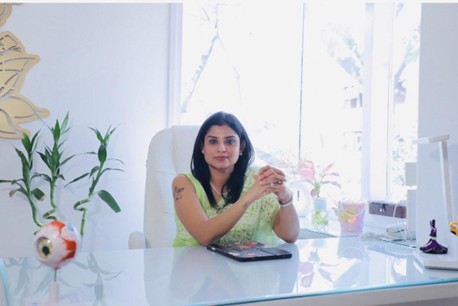
Dr. Anchal Gupta, a senior cornea and cataract surgeon, founded Netram Eye Foundation. With over 16 years of experience, she specializes in cataract surgeries and corneal transplants, advancing eye health services in India.
Dr. Anchal Gupta, MBBS, MS Ophthalmology, is a senior Cornea, Refractive, and Cataract surgeon with over 16 years of experience. She completed her Masters in Ophthalmology from King George Medical University, Lucknow, and pursued specialized training at Venu Eye Institute, Delhi, and L.V. Prasad Eye Institute, Hyderabad. Driven by a passion to combat reversible blindness, she founded Netram Eye Foundation from scratch, now a premier super-specialty eye care center in South Delhi, listed among the top ten eye hospitals in Delhi NCR. Netram also operates as an NGO, providing community eye care services across 23 states of India. A beacon of equitable eye care, Dr. Gupta successfully integrates private and charitable services, ensuring quality ophthalmic care for all.
20. Ms. Anu Acharya, CEO, Mapmygenome India
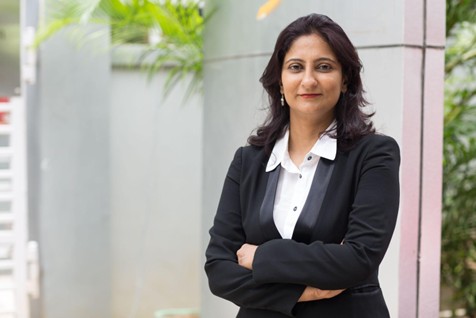
Anu Acharya pioneered personal genomics in India through Mapmygenome.She pioneered the concept of personal genomics in India, driving the company’s success through product innovation, and network expansion Previously, Ms. Acharya led Ocimum Biosolutions, a genomics outsourcing company, through international acquisitions and product launches.
A Distinguished Alumna from IIT Kharagpur, Ms. Anu Acharya is the CEO of Mapmygenome India, a leading genomics company with the vision to “touch 100 million lives using genomics.” She pioneered the concept of personal genomics in India, driving the company’s success through product innovation, network expansion, and successful funding rounds. Previously, Ms. Acharya led Ocimum Biosolutions, a genomics outsourcing company, through international acquisitions and product launches. Her leadership has earned numerous awards, including the ET Startup Awards and recognition as a top innovative healthcare startup.
21. Dr. Nandita P. Palshetkar, Director, Bloom IVF

A leading name in reproductive medicine, Dr. Nandita Palshetkar drives success in IVF through Bloom IVF. With global recognition, she’s transforming fertility care in India
With over 30 years of experience in reproductive medicine, Dr. Nandita P. Palshetkar is the Founder and Medical Director of Bloom IVF Group, which operates eight centers across India. Her expertise has led to high success rates in assisted reproductive technologies, comparable to international standards. Dr. Palshetkar's contributions have been acknowledged through numerous awards, including the Fellowship honoris causa from the Royal College, UK of Obstetricians and Gynaecologists in 2021, recognizing her impact on women's healthcare.
22. Dr. Devlina Chakravarty, Managing Director, Artemis Hospitals
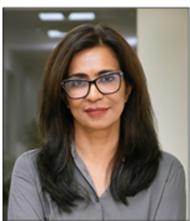
A visionary radiologist and MD of Artemis Hospitals, Dr. Devlina Chakravarty champions ethical, AI-driven, and patient-centric healthcare. Her leadership is transforming Artemis into a hub of clinical excellence and innovation.
A distinguished radiologist and healthcare leader, Dr. Devlina Chakravarty has been instrumental in shaping Artemis Hospitals into a premier healthcare destination. An alumna of Lady Hardinge Medical College and Mumbai University, she honed her expertise through global fellowships in Germany, the U.S., and the U.K. Passionate about ethical, transparent, and quality-driven healthcare, she advocates for accessible and affordable medical services. A champion of AI-driven innovations and clinical excellence, she actively engages in policy advocacy. Dr. Chakravarty’s leadership has positioned Artemis Hospitals as a hub for personalized tertiary care, setting new benchmarks in patient safety and service excellence.
23. Zubaida Bai, President and CEO, Grameen Foundation
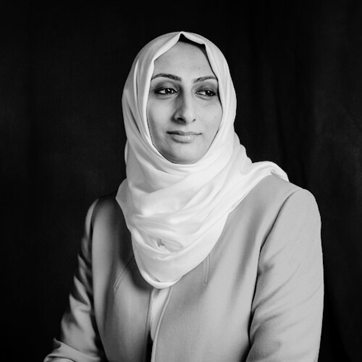
Zubaida Bai is a social entrepreneur dedicated to improving global health and opportunities for women. She founded ayzh in 2009 to develop low-cost, life-saving technologies for women's reproductive health. Today, she serves as the President and CEO of Grameen Foundation.
Zubaida Bai is a social entrepreneur and former mechanical engineer dedicated to improving global health and opportunities for women. After witnessing the challenges women face in resource-limited settings in India, she founded Ayzh in 2009 to develop low-cost, life-saving technologies for women's reproductive health. Today, she serves as the President and CEO of Grameen Foundation which enables women and their families to leave poverty and end hunger through holistic programming. She leverages her expertise in sustainable development and social innovation to drive impactful change.
24. Ms. Samara Mahindra, Founder & Director, CARER

Samara Mahindra founded CARER, India’s first integrative oncology platform. She is a pioneer in holistic cancer care. A TEDx speaker and recognized industry leader, Samara brings 11+ years of expertise in holistic cancer care, bridging gaps in oncology through prevention and therapy
Samara Mahindra is a pioneer in integrative oncology, leading CARER, India’s first evidence-based cancer care platform that enhances treatment response and quality of life. A TEDx speaker and recognized industry leader, Samara brings 11+ years of expertise in holistic cancer care, bridging gaps in oncology through prevention and therapy. Her vision is to redefine cancer care in India with innovation and patient-centered solutions.
25. Dr. Soniya Nityanand, Vice-Chancellor, King George’s Medical University (KGMU)
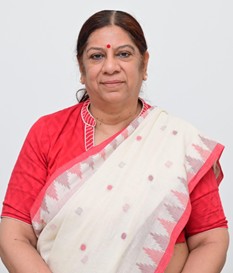
Dr. Soniya Nityanand, a bone marrow specialist is the Vice Chancellor at KGMU. She established a Bone Marrow Transplant Unit and expanded the campus, advancing medical education and care.
Dr Soniya Nityanand has played a pioneer role in establishing the field of clinical hematology and bone marrow/hematopoietic stem cell transplantation (BMT/HSCT) in the country. She is the first lady bone marrow transplant specialist in India. She is also one of the leaders in the stem cell research in India. Currently she is Vice-Chancellor of King George’s Medical University (KGMU), Lucknow. She has previously served as Director of Ram Manohar Lohia Institute of Medical Sciences, Lucknow, and Professor and Head, Department of Hematology and Stem Cell Research Centre at Sanjay Gandhi Post Graduate Institute of Medical Sciences, Lucknow.
26. Dr. Sangeeta Ravat, Dean and Professor of Neurology, Seth G.S. Medical College and KEM Hospital, President, India Academy of Neurology
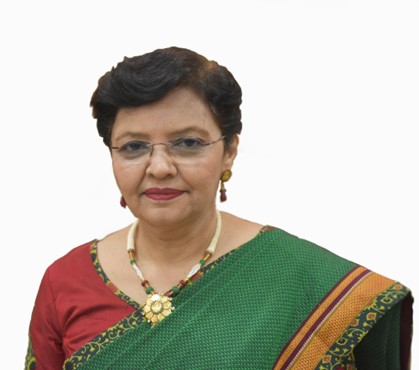
Dr. Sangeeta Ravat leads KEM Hospital, advancing epilepsy care and research. As an academic neuro-epileptologist, she has been pivotal in advancing epilepsy care and research in India. She was elected President of the Indian Academy of Neurology in 2023.
Dr. Sangeeta Ravat is the Dean and a Professor of Neurology at Seth G.S. Medical College and KEM Hospital in Mumbai. As an academic neuro-epileptologist, she has been pivotal in advancing epilepsy care and research in India. Under her leadership, KEM Hospital has maintained its reputation for excellence in healthcare, managing upto 12,91,808 outpatient visits and 71,438 surgeries as per Annual Report 2024.
In 2023, Dr. Ravat was elected as the President of the Indian Academy of Neurology, reflecting her significant contributions to the field.
27. Dr. Garima Sawhney, Co-founder, Pristyn Care

Dr. Garima Sawhney co-founded Pristyn Care in 2018 to simplify surgical care. The startup focuses on elective surgeries, using advanced technology for seamless patient experiences. With over 15 years as a gynecologist, Dr. Sawhney is a leader in patient-centric healthcare services.
With over 15 years of experience as a Senior Gynecologist, Dr. Garima Sawhney co-founded Pristyn Care in 2018 alongside her colleagues Vaibhav Kapoor and Harsimarbir Singh. Recognizing the complexities and stress associated with surgical procedures, they established Pristyn Care to provide advanced surgical care with a focus on patient-centric services. The Gurugram-based startup specializes in elective surgeries, utilizing cutting-edge medical technology to ensure seamless patient experiences. Dr. Sawhney's commitment to improving surgical care has solidified her reputation as a leader in healthcare services.
28. Shailja Mittal, Founder & CEO, RxMen(Formerly Qurex)
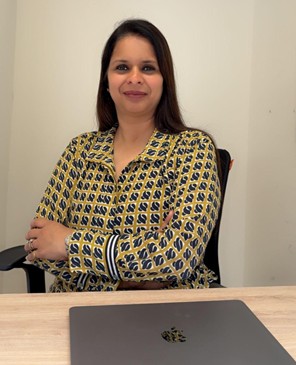
Shailja Mittal, Founder & CEO of RxMen, is breaking barriers in men’s health by addressing stigmatized issues like sexual health, stress, and more. Her data-driven, expert-designed solutions offer personalized care, making RxMen India’s fastest-growing platform in this space.
Shailja Mittal is the founder of RxMen, a health tech platform dedicated to addressing sexual health issues. Recognizing the stigma surrounding sexual health in India, she launched RxMen to provide comprehensive solutions and raise awareness. RxMEN is India’s fastest growing platform offering customized, root-cause-based treatments for men’s health issues which they feel judged for — starting with sexual health and expanding to stress, sleep, baldness, weight management and more. Unlike one-size-fits-all solutions, expert-designed and data driven treatment journeys provide consistent results. Shailja's innovative approach aims to destigmatize conversations around sexual health, making her a pioneering leader in this sector.
29. Sheenu Jhawar, Director, Apex Hospitals & ACE Consulting
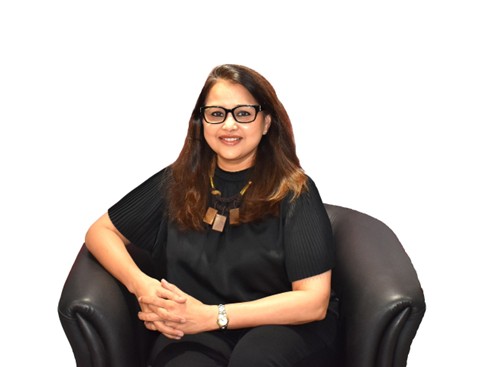
Dr. Sheenu Jhawar oversees Apex Hospitals, expanding multispecialty healthcare in Rajasthan. She co-founded ACE Vision Health Consultants and leads TiE Rajasthan, fostering healthcare innovation and entrepreneurship.
Dr. Sheenu Jhawar is a healthcare professional, and is part of the promoter group of Apex Hospitals. She sits as a Director on the Board of the group that runs 7 multi – super specialty chain of hospitals in the state of Rajasthan.
She is a TEDx speaker, and a Ph.D in Maternal Mental Health. She is also founder of a Healthcare Consulting company – ACE Vision Health Consultants P L - which has its client base in India, Africa and the U.K. ACE is India’s first Clinical Governance Consulting firm, and was also listed among ten key National Hospital Planning firms, by Ernst & Young report commissioned by India Brand Equity Foundation
She has been part of the State Think-Tank for a World Bank aided healthcare project for the Rajasthan Government, and has also worked as a Clinical Auditor, for a large NHS Trust Hospital in the U.K. With continuous education programs from London School of Hygiene and Tropical Medicine, Harvard, North Carolina Univ. Chapel Hill, and Oxford, Sheenu has ensured to upskill herself in diverse domains within Healthcare.
Sheenu has an avid interest in the Academic side. She has not only been published in high Impact- Factor journals, but is also a reviewer for several such publications, adding to her understanding of the Scientific world, which ultimately becomes a great asset while mentoring Healthcare start-ups in medical devices, and the like.
While Sheenu devotes her maximum time to TiE, she is also a member of the International Marce Society of Perinatal Mental Health, and mentors budding mental health researchers, and in the past, has been a member of the State council of CII Rajasthan with the purpose of furthering the collaborative advocacy on Healthcare to the State Government.
She is very passionate about the entrepreneurial landscape, and currently serves as an elected member on the TiE Global Board of Trustees. She is also President of TiE Rajasthan.
30. Dr. Ritu Mittal Garg, Chief Growth & Innovation Officer, Fortis Healthcare
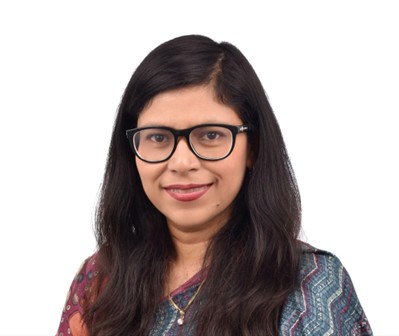
An ENT Surgeon turned into management professional, She is the Chief Growth & Innovation Officer at Fortis Healthcare. With a wealth of experience in strategy development, medical programs, clinical talent management, and medical alliances, Keen Interest in digital innovation. Dr Garg has astute understanding of healthcare dynamics and changing landscape in this space. Dr. Garg plays a pivotal role in driving growth and innovation at Fortis Healthcare.
Dr. Garg's academic credentials are equally impressive. She earned her Post Graduate Programme in Business Management from the Indian School of Business in 2009 and holds an M.B.B.S and M.S in ENT from Lady Hardinge Medical College, Delhi
Disclaimer
The names featured in International Women’s Day 2025: 30 Women Driving Change in Healthcare are not ranked in any order. We equally value each leader’s contributions and recognize that many more women are making a significant impact in healthcare. This list is a celebration of their efforts and the ongoing progress in the field.
Union Budget 2025: Reshaping Healthcare with Lifesaving Drugs, Cancer Care Expansion, and a Medical Education Boom
Dr.Tarang Gianchandani, CEO- Sir H.N. Reliance Foundation Hospital, Mumbai
The government’s focus on strengthening India’s healthcare continues in Union Budget 2025, with an emphasis on cancer care and medical education. To ease the financial burden of life-threatening diseases, the full exemption of basic customs duty on 36 life-saving drugs, including cancer and rare disease treatments, ensures critical treatments remain accessible. Additionally, the establishment of daycare cancer centers in all district hospitals, with 200 hospitals operational by 2026, will make cancer care more accessible and reduce the need for long-distance travel. The introduction of 10,000 new medical seats this year and plans for 75,000 more over five years aim to address the healthcare expertise gap, reinforcing India’s global healthcare leadership.
Dr. Rakesh Gupta, Chairman, Sarvodaya Healthcare
The Union Budget 2025 reflects the government’s commitment to strengthening India’s healthcare system, focusing on affordability, quality, and accessibility. A key proposal is establishing Day Care Cancer Centers in every district hospital, bringing critical care closer to underserved and rural areas, ensuring timely treatment without long-distance travel. Additionally, the investment in AI-driven healthcare solutions aims to enhance diagnostic accuracy, treatment efficiency, and overall patient care, positioning India as a global leader in medical tourism. The 'Heal in India' initiative, supported by infrastructure and technological advancements, will attract international patients seeking affordable, high-quality care, solidifying India’s status as a global healthcare hub.
Shashank Avadhani, Co-founder, and CEO at Alyve Health
Alyve Health welcomes Union Budget 2025, a major step towards a healthier India. The government’s focus on promoting medical tourism and the Heal in India initiative, coupled with streamlined visa norms, aligns with our vision of making India a global health hub. The increase in FDI in the insurance sector to 100% will foster competition and expand access to essential health services, reducing financial barriers to care. The emphasis on vegetables and fruits supports our core philosophy of promoting healthier lifestyles. The exemption of 36 life-saving drugs from customs duty improves access to treatments for cancer and rare diseases. The inclusion of 1 crore gig workers in the PM Jan Arogya Yojana ensures healthcare access for this vital workforce. Increased funding for the National Health Mission and mental health initiatives will address healthcare disparities, paving the way for a more inclusive system. Alyve Health is eager to collaborate with stakeholders to improve health outcomes for all.
Abhay Soi, Chairman and Managing Director, Max Healthcare Institute Limited
The Union Budget 2025 reinforces India’s journey toward a Viksit Bharat by prioritizing growth in key sectors like agriculture, manufacturing, and healthcare. As the Finance Minister highlighted, a country is defined not only by its land but its people, and quality, affordable healthcare is essential for empowerment. This Budget demonstrates a strong commitment to strengthening India’s healthcare ecosystem through initiatives in medical education, cancer care, and access to life-saving medicines. The addition of 10,000 medical seats next year, with plans for 75,000 more over five years, will help bridge the doctor-patient gap. Establishing 200 cancer centers will improve oncology care nationwide, and the exemption of customs duty on critical cancer and rare disease drugs will make treatments more affordable. The 'Heal in India' initiative will position India as a global healthcare destination. These measures ensure quality care for all, paving the way for a truly ‘Viksit Bharat’ in healthcare.
Dr Rajeev Boudhankar, Medical director, Holy Family Hospital, Bandra, Mumbai
The strengthening of the Rural Agriculture program will help reduce farmers' debts and suicides, indirectly benefiting national nutrition and mother-child health programs by improving the nutritional status of pregnant and lactating women and children. This program, alongside initiatives like the National Mission for edible oils, pulses, and vegetables, will address India’s high maternal and under-5 mortality rates. The budget also strengthens the Anganwadi nutrition program to promote health for vulnerable populations. The focus on clean energy technologies, including nuclear, solar, and wind, will reduce air pollution and diseases like asthma and COPD. Broadband connections to Primary Health Centers will enhance rural healthcare through telemedicine, lowering healthcare costs and advancing Universal Healthcare coverage. AI integration in healthcare will foster research and improve Centers of Excellence. The addition of 10,000 medical seats and daycare cancer centers will strengthen healthcare resources and early detection. Other initiatives like the "Heal in India" and rationalized drug duties will boost medical tourism and healthcare access.
Dr. Tejinder Kataria, Chairperson Radiation oncology & cancer Center, Medanta The Medicity
The Union Budget 2025-2026 announces the establishment of day care cancer centers in all district hospitals over the next three years, with 200 centers set to open in 2025-2026. India has 788 districts, and these centers will play a vital role in making cancer care more accessible. The decision is widely welcomed by physicians and cancer care providers. With day care cancer centers in every district hospital, patients can undergo procedures like biopsies, endoscopies, post-tracheostomy care, and chemotherapy close to home, reducing travel burdens. These centers will also provide palliative care, such as fluid drainage for improved breathing and quality of life, and pain management through available medications. This initiative will make cancer treatment more accessible, timely, and efficient, improving patient outcomes across India’s diverse regions and ensuring better care for those in need.
Dr Rajiv Chhibber, Vice President SMT
The Union Budget 2025-26 is a significant step toward improving healthcare accessibility, focusing on decongesting major hospitals. This initiative will allow large hospitals to specialize in care for needy patients, reducing long waiting lists at tertiary centers. Telemedicine services and broadband transmission will enable patients to send reports like blood tests, CT scans, and ultrasounds from district hospitals to specialists. Remote consultations will ensure patients receive guidance and authentic medicines from Jan-Aushidhi centers, reducing the need for long-distance travel. The budget also continues the government’s efforts toward Ease of Doing Business and Ease of Living, supporting the vision for a Viksit Bharat by 2047. The Finance Minister’s focus on Garib, Youth, Annadaata, and Nari (GYAN), along with infrastructure development through PM Gati Shakti and support for MSMEs and startups, will strengthen India’s global position. Healthcare support for rare diseases and cancer, coupled with a boost to R&D, will enhance India’s capabilities in critical drugs and medical devices.
Dr. Azad Moopen, Founder & Chairman, Aster DM Healthcare
The Union Budget 2025 reinforces India’s commitment to building a resilient and inclusive healthcare system, focusing on accessibility, affordability, and quality care for all. The addition of 75,000 new medical seats will address the long-standing shortage of healthcare professionals, improving care availability and quality in underserved areas. The establishment of 200 cancer daycare centers in district hospitals will decentralize cancer treatment, making care more accessible and enabling timely interventions. The exemption of customs duties on cancer drugs and 36 life-saving medicines will make critical treatments more affordable, while reduced duties on six additional medicines remove financial barriers to essential treatments for chronic and rare diseases. The e-Shram healthcare insurance for gig workers, combined with increased investment in medical research and genetic studies, shows a forward-thinking approach to public health. Easing visa norms for medical tourism under the ‘Heal in India’ initiative enhances India’s position as a global healthcare destination, benefiting patients and the economy.
Deepal Shah, Group CFO, Allcargo Group
The Union Budget 2025 lays the foundation for long-term economic growth by focusing on key drivers such as consumption, manufacturing, infrastructure, innovation, employment, and private investment, while maintaining fiscal prudence. Personal tax reforms are set to stimulate urban consumption, boosting demand in the economy. The continued focus on infrastructure development will enhance logistics efficiency, crucial for economic growth. Regulatory reforms aimed at improving the ease of doing business will attract private investment across sectors. The proposal to transform India Post into a major public logistics organization will boost nationwide logistics capacity, while supporting shipbuilding will increase India’s share in global maritime trade. The budget prioritizes the adoption of AI and deep tech innovations to drive development in various sectors. These initiatives demonstrate the government's commitment to advancing economic growth, embracing innovation, and strengthening macroeconomic stability, ensuring India’s continued progress on the global stage.
Mr Abrarali Dalal, Managing Director and CEO, Sahyadri Hospitals Pvt Ltd
The Union Budget 2025 anchors itself in the vision of a 'Viksit Bharat,' focusing on providing quality education and comprehensive healthcare for all. A key highlight is the exemption of customs duty on lifesaving medicines, offering relief to patients with cancer, rare diseases, and chronic conditions. The government aims to position India as a global leader in medical tourism through the 'Heal in India' initiative. The budget also prioritizes strengthening medical infrastructure, including the addition of 75,000 medical seats over the next five years to enhance the healthcare workforce. Expanding broadband connectivity in primary healthcare centers will ensure quality care reaches even the most remote areas. The establishment of 200 day-care cancer centers across district hospitals will improve accessibility and affordability. The Saksham Anganwadi and Poshan 2.0 programs will provide nutritional support to over nine crore beneficiaries, including children, pregnant women, and adolescent girls, improving health outcomes and addressing health disparities.
Dr. Harshit Jain – Founder & Global CEO at Doceree
The Union Budget 2025-26 lays a strong foundation for India to lead in global healthcare and innovation, with a ₹90,958 crore healthcare allocation prioritizing both accessibility and quality. Investments in daycare cancer centers, the addition of 10,000 new medical seats, and increased broadband connectivity in rural health centers reflect a commitment to enhancing healthcare infrastructure. The introduction of healthcare identity cards for gig workers under the PM Jan Arogya Yojana promotes healthcare equity. On the entrepreneurial front, the budget supports the healthcare ecosystem by raising Mudra Loan limits and offering targeted assistance to MSMEs, empowering pharma and healthtech innovators. The establishment of Centres of Excellence for AI and expanded STEM education via Atal Tinkering Labs will drive technological disruption in healthcare. Additionally, the focus on funding marginalized, first-time women entrepreneurs will boost their participation in the healthcare sector. The 'Heal in India' initiative will promote medical tourism, creating jobs and attracting foreign investment.
Col. Rajeev Mannali ,CEO at BR Life SUT Multi Speciality Hospital, Thiruvananthapuram
This year’s budget stands out as a common man’s budget, addressing key concerns with urgency. The long-awaited income tax slab rationalization has been implemented, boosting small savings and increasing spending power in both rural and urban areas. The housing sector benefits from increased exemptions for two self-occupied houses, positively impacting real estate in the short and mid-term. The SWAMIH fund, with a significant allocation, will support affordable and mid-income housing, benefiting lower and middle-income groups. Additionally, raising the TDS limit on rent beyond ₹2.4 lakhs provides relief to both tenants and landlords.
MSMEs will see growth and job creation with increased investment, fostering stability in the sector. However, healthcare has not received the attention it deserves. With the goal of a healthier India, its allocation should have been at least 2.5% of GDP. Overall, the budget prioritizes the common man’s welfare, ensuring economic revitalization and social well-being.
The Human Stories Behind Cancer Innovation: Discover the Stories Behind India's Leading Oncology Breakthroughs
On World Cancer Day, we celebrate the remarkable Indian companies that are revolutionizing cancer care through their groundbreaking innovations and unwavering dedication. These organizations are not just businesses; they are beacons of hope, driven by the personal experiences and profound empathy of their founders. Each story is a testament to the power of resilience and the impact of personalized, compassionate care in the fight against cancer.
Behind every successful company is a founder with a vision. These individuals are not just entrepreneurs; they are trailblazers who have turned their personal struggles into life-saving solutions. From cancer survivors to those who have lost loved ones, their journeys are marked by a deep sense of purpose and an unyielding commitment to making a difference. Their stories inspire us to believe that even the most challenging circumstances can lead to transformative change.
1. Karkinos Healthcare: Transforming Oncology and Healthcare Ecosystem with Technology
Co- Founder: Dr. Moni Abraham Kuriakose
Founded: 2020
Headquarters: Mumbai, India
Focus: Technology-led, purpose-driven oncology platform enabling discovery through delivery of care.
Personal Reason: Dr. Moni Abraham Kuriakose, a globally renowned head and neck surgical oncologist, co-founded Karkinos Healthcare and serves as the Medical Director and CEO of Kerala Operations. With an extensive career spanning institutions such as Narayana Health City, Bengaluru, and Roswell Park Cancer Institute, New York, he brings unmatched expertise in oncology research and patient care. His clinical interests include the management of advanced head and neck cancer, skull-base surgery, 3D planning, and functional reconstruction. His research focuses on oral cancer stem cells and early cancer detection technologies.
Innovation: Karkinos Healthcare is a step-down subsidiary of Reliance Industries Limited, a technology-led, purpose-driven oncology platform enabling discovery through delivery of care. Using the hub-and-spoke and further spoke model Karkinos has pioneered the Distributed Cancer Care Model that addresses cancer prevention, early detection, diagnostics, care delivery and research cutting across the patient care continuum.
Through a network of world-class advanced molecular diagnostic and research labs, collaborations with leading academic and healthcare institutions in India and abroad and a technology-led platform approach Karkinos delivers quality cancer care in India and beyond.
Impact: Karkinos Healthcare has made significant strides in improving cancer care by focusing on early detection and diagnosis. The company has received recognition for its commitment to privacy and innovation, including the DSCI Excellence Award 2023. By prioritising efficiency and cost-effectiveness without compromising quality, Karkinos is on a mission to provide end-to-end cancer care solutions where no person is deprived of care, for lack of access or affordability.
2. HealthCare Global Enterprise Ltd. (HCG): Pioneers in Comprehensive Cancer Care
Founder: Dr. B.S. Ajaikumar
Founded: 1989
Headquarters: Bangalore, India
Focus: Single Speciality Oncology hospital
Innovation: HealthCare Global Enterprises Ltd. (HCG) is a leading healthcare provider in India, renowned for its specialized cancer care services. HCG operates a network of comprehensive cancer centers, leveraging cutting-edge technology and a multidisciplinary approach to deliver personalized and high-quality care. The organization's commitment to value-based medicine ensures that patients receive the best possible treatment outcomes while preserving their quality of life.
Impact: HCG has significantly advanced cancer care in India and beyond. With over 22 comprehensive cancer centers and a team of 450+ oncologists, HCG has treated millions of patients over the past three decades. The organization's focus on early detection, advanced diagnostics, and innovative treatments has improved survival rates and enhanced the overall patient experience. HCG's expansion into Tier II and III cities, as well as its presence in Nairobi, Kenya, underscores its mission to make high-quality cancer care accessible to all.
HCG functions on a unique business model, known as the "hub-and-spoke model". This hub-and-spoke model in cancer care has been mentioned as a case study by the Harvard Business Review. Hubs are the specialized centres located in urban areas, which are designed to enable high-end diagnostic and treatment procedures, while spokes are those arrayed around the hubs in tier 2 and tier 3 regions, primarily focusing on the routine diagnosis, treatment and follow-up care. Through the hub-and-spoke model, HCG has formed strategic partnerships with several eminent doctors across the country to improve the clinical care and patient experience for cancer patients. Through this approach, HCG has made comprehensive, patient-centric, and value-based cancer care accessible for patients from all walks of life.
HCG's dedication to research and innovation, combined with its robust infrastructure and compassionate care, positions it as a leader in the global fight against cancer.
3. OncoStem CanAssist Breast: Advancing Personalized Breast Cancer Care
Founder: Dr. Manjiri Bakre
Founded: 2011
Headquarters: Bengaluru, Karnataka, India
Focus: Personalized cancer diagnostics, prognostic testing, and treatment planning
Personal Reason: OncoStem Diagnostics was founded by Dr. Manjiri Bakre to address the critical need for accurate, affordable and personalized cancer prognostic tests. Driven by the vision of improving patient’s treatment leading to better outcomes through advanced and informed technology, they developed CanAssist Breast- a prognostic test that helps in managing early-stage, hormone receptor-positive breast cancer.
Innovation: CanAssist Breast is a groundbreaking prognostic tool that evaluates multiple biomarkers in a tumor sample to calculate a risk score, indicating the likelihood of cancer recurrence within five years post-surgery. This AI-driven test uses a unique algorithm to classify patients as 'low-risk' or 'high-risk' for recurrence, enabling oncologists to tailor treatment plans. By identifying patients who may not benefit from chemotherapy, CanAssist Breast helps avoid unnecessary aggressive treatments and their side effects.
Impact: CanAssist Breast has shown remarkable accuracy, with a negative predictive value (NPV) of 95%, making it a reliable tool for treatment planning. The test has benefited over 7,000 patients globally and is trusted by more than 700 oncologists worldwide. By providing personalized insights, CanAssist Breast enhances the quality of life for patients and sets a new standard in breast cancer care. OncoStem plans to add more such prognostic tests for different cancers in the future.
4. Datar Cancer Genetics: Advancing Oncology Through Precision Diagnostics
Founder: Rajan Datar
Founded: 2013
Headquarters: Nashik, Maharashtra, India
Focus: Molecular oncology, precision diagnostics, and non-invasive cancer detection
Personal Reason: Datar Cancer Genetics was founded by Rajan Datar with the mission to revolutionize cancer diagnostics and treatment through advanced molecular oncology. The company aims to provide innovative, non-invasive solutions for early cancer detection and management, leveraging cutting-edge technology and extensive research.
Innovation: Datar Cancer Genetics is a world-leading molecular oncology facility with a fully equipped India and UK-based laboratories, integrated process platforms, and an in-house bioinformatics team. The company specializes in developing blood-based diagnostics that can detect cancer early, offer non-invasive treatment options, and track the progression of the disease or its recurrence.
Impact: Datar Cancer Genetics has significantly advanced cancer care by focusing on early detection and personalized treatment. Their mainstream innovative tests, such as Trucheck™, Exacta™ and Cancertrack™, are CE accredited and offer non-invasive screening and management solutions for various types of cancer, including lung, stomach, colon, pancreas, prostate, breast, and ovarian cancers. These solutions utilize advanced AI and molecular techniques to optimize therapy and improve patient outcomes. Datar has also received USFDA Breakthrough Designations for their CTC-based early detection solutions for breast, prostate and brain cancers.
By providing safe, accurate, and easy solutions for cancer detection and management, the company is dedicated to improving the quality of life for cancer patients worldwide.
5. ZenOnco.io: Integrative Oncology for Comprehensive Cancer Care
Founder: Dimple Parmar
Founded: 2019
Headquarters: Bengaluru, Karnataka, India
Focus: Integrative oncology, personalized cancer treatment, and holistic patient support
Personal Reason: ZenOnco.io was founded by Dimple Parmar and Kishan Shah, who experienced the shortcomings of the cancer care system firsthand. Dimple Parmar lost her husband, Nitesh, to cancer in 2018, which led her to establish Love Heals Cancer, a registered NGO to support cancer patients. Kishan Shah, with a background in investment banking, joined Dimple after volunteering at Love Heals Cancer. Together, they recognized the need for a scalable and sustainable solution in the cancer care ecosystem.
Innovation: ZenOnco.io is India’s first integrative oncology cancer care platform, offering a comprehensive approach to cancer treatment that combines conventional medical treatments with complementary therapies. The platform provides personalized nutrition, fitness, and psychology programs tailored to the patient's phase of treatment, including preventive, prehab, cure, rehab, recurrence prevention, and palliative care. Services include medical treatment, integrative medicines, medical cannabis, anti-cancer diet, Ayurveda, and mind & body wellness.
Impact: ZenOnco.io has significantly improved the quality of life for cancer patients by offering a holistic approach to cancer care. ZenOnco.io has guided over 100,000 cancer patients and has a community of over 10,000 members, with 71% of patients reporting an improvement in quality of life and 68% experiencing a reduction in pain. By providing end-to-end care and connecting patients with a multidisciplinary team of experts, ZenOnco.io is setting new standards for cancer care in India and beyond.
6. Sascan Meditech: Pioneering Early Cancer Detection with Multispectral Imaging
Founder: Dr. Subhash Narayanan
Founded: 2015
Headquarters: Thiruvananthapuram, Kerala, India
Focus: Early detection of oral and cervical cancer using non-invasive, multispectral imaging technology
Personal Reason: Driven by his mother’s misdiagnosis of head and neck cancer, Dr. Subhash Narayanan founded Sascan Meditech to develop better diagnostic tools. Traditional oral cancer screening methods are invasive and not widely accessible, especially in rural areas. Dr. Narayanan aimed to create a non-invasive, affordable solution for early cancer detection.
Innovation: Sascan Meditech's flagship product, OralScan, is a handheld, non-invasive device that uses multispectral imaging technology to detect pre-cancerous and cancerous lesions in the oral cavity. The device captures high-resolution images of tissue autofluorescence and oxygenated hemoglobin absorption, providing real-time feedback through a cloud-based machine learning algorithm. This technology enhances diagnostic accuracy and reduces the need for invasive biopsies.
Impact: OralScan has shown remarkable accuracy in clinical trials, with a sensitivity of over 90% and specificity of 92%. The device is portable, user-friendly, and suitable for remote locations without electricity or internet access. Sascan Meditech's efforts have led to the screening of thousands of patients, particularly in rural areas where access to advanced healthcare is limited. The company has received multiple awards, including the National Startup India Award 2021 and the Anjani Mashelkar Inclusive Innovation Award 2021.
Sascan Meditech's commitment to innovation and accessibility positions it as a leader in early cancer detection, offering a safer and more effective alternative to traditional screening methods
7. CanSupport: Pioneering Palliative Care for Cancer Patients
Founder: Harmala Gupta
Founded: 1996
Headquarters: New Delhi, India
Focus: Palliative care for cancer patients and their families
Personal Reason: Harmala Gupta's journey with cancer began in 1985 when she was diagnosed with Hodgkin's lymphoma while working on her Ph.D. in Montreal, Canada. Her experience with the comprehensive and compassionate care she received during her treatment inspired her to bring similar support to cancer patients in India. After recovering, she founded CanSupport in 1996 to provide free, home-based palliative care to those in need
Innovation: CanSupport is recognized as the largest stand-alone home-based palliative care program in India. It offers a comprehensive range of services including home care, outpatient clinics, day care centers, and a helpline. The organization also provides bereavement and rehabilitation support to families.
Impact: CanSupport has significantly improved the quality of life for thousands of cancer patients by providing free, comprehensive palliative care. The organization has received numerous awards for its work, including being declared a "Public Health Champion" by the World Health Organization in 2017.
8. Onco.com: Transforming Cancer Care Through Digital Innovation
Founder: Rashie Jain and Amit Jotwani
Founded: 2016
Headquarters: Bengaluru, Karnataka, India
Focus: Personalized cancer treatment, virtual consultations, and comprehensive care management
Personal Reason: Onco.com was founded by Rashie Jain and Amit Jotwani to address the significant challenges faced by cancer patients, especially in middle-income countries like India. The founders recognized the need for a platform that could provide personalized, evidence-based treatment advice and connect patients with top oncologists and treatment centers.
Innovation: Onco.com is an online aggregator for cancer care, offering personalized scientific advice to cancer patients through its network of oncologists. The platform connects patients with relevant treatment centers, doctors, and labs, providing solutions to their medical problems. Onco.com leverages algorithms and tech-powered solutions to offer personalized recommendations on the right oncologists and even connect patients with doctors. The platform also offers a 25-day follow-up window for patients to talk to the care team for all their questions.
Impact: Onco.com has significantly improved the cancer care landscape by providing accessible, personalized treatment advice. The platform has served over 100,000 patients to date, offering them evidence-based treatment plans and connecting them with the right oncologists. By providing end-to-end care and leveraging technology, Onco.com is setting new standards for cancer care in India and beyond.
9. Navya Network: Empowering Cancer Care with Technology
Founders: Dr. Naresh Ramarajan. and Gitika Srivastava
Founded: 2010
Headquarters: Bengaluru, Karnataka, India
Focus: Cancer informatics, medical decision support, and personalized treatment plans
Personal Reason: Navya Network was co-founded by Dr. Naresh Ramarajan and Gitika Srivastava. Dr. Ramarajan, a physician with a background in both Emergency Medicine and Internal Medicine, and Srivastava, a computer scientist and entrepreneur, recognized the need for a technology-driven solution to improve cancer care. Their vision was to leverage AI and machine learning to provide personalized, evidence-based treatment plans for cancer patients.
Innovation: Navya Network’s flagship product, the Navya Cancer Data Model (NCDM), is a medical decision support system that leverages AI and machine learning to streamline the process of arriving at cancer treatment plans. The NCDM collects and synthesizes patient records, generates a structured case summary, and offers structured treatment options derived from evidence and expert opinions. This technology reduces the time it takes for oncologists to review records and render treatment decisions, often from hours to just 5-10 minutes.
Impact: Since 2012, Navya Network has helped over 120,000 patients from 75 countries gain access to expert-led treatment plans, resulting in improved clinical outcomes. The platform has been recognized at leading scientific conferences such as ASCO, SABCS, and ESMO, and is part of the White House CancerX Moonshot Initiative. Navya Network’s technology not only enhances the efficiency of cancer care but also empowers patients with clear, understandable treatment plans
Dr. Rakesh Gupta, Chairman- Sarvodaya Healthcare
As we approach the 2025 Union Budget, the focus must shift toward building a resilient and inclusive healthcare ecosystem. With India’s healthcare industry projected to reach $683 billion by 2025, investments in emerging trends like Remote Patient Monitoring (RPM), AI-powered diagnostics, and digital therapeutics (DTx) are crucial to address the dual challenges of accessibility and affordability. Strengthening rural healthcare infrastructure, supporting digital health initiatives like Ayushman Bharat Digital Mission, and enabling technologies such as blockchain and personalized medicine will be key drivers of progress. This budget has the potential to transform healthcare delivery, fostering a future where cutting-edge solutions improve outcomes for millions while ensuring inclusivity and compassion remain central to patient care.
Dr. Vikas Agarwal,CEO & Founder, Dentalkart.
As the Union Budget approaches, it is essential to prioritize reforms that make healthcare more accessible and affordable. At Dentalkart, we support a revision of the current GST structure on healthcare products, particularly those taxed at 18%.
Dental and medical supplies are vital for public health and should not be categorized as luxury items. Implementing a uniform GST rate of 5% across all healthcare products would significantly reduce costs for both providers and patients. This would ensure essential medical and dental supplies remain affordable and accessible, ultimately fostering a healthier nation.
Reducing GST on healthcare products is not merely an economic reform but a commitment to public well-being. Such a move would also support the growth of the healthcare sector by encouraging innovation, enhancing service delivery, and enabling healthcare professionals to deliver better care.
Surajit Chakrabartty, CFO - MedGenome
As India continues to prioritize healthcare and innovation to drive its long-term development goals, we remain optimistic that the upcoming budget will recognize the transformative role genomics can play in revolutionizing diagnosis and improving healthcare outcomes. Over the next 5-7 years, we anticipate genomic testing becoming an integral part of routine healthcare, driving advancements in early disease detection and personalized medicine. To fully unlock the potential of genomics, we hope the budget will allocate substantial funding for research and infrastructure development in genomics, accelerating the adoption of cutting-edge technologies and ensuring affordable and equitable access to diagnostics across all demographics.
Strengthening public-private partnerships, offering tax incentives for biotech startups, and cultivating a strong policy framework will allow groundbreaking innovations to scale and reach every corner of the country helping tackle some of India’s most urgent healthcare challenges.
To position India as a global leader in personalized healthcare, it is imperative to enhance the infrastructure for precision medicine and foster collaboration across sectors. These initiatives will not only lead to better patient outcomes through timely and targeted interventions but also establish India as a hub for multi-omics led diagnostics, improving the health of millions while driving economic growth.
SC Nagendra Swamy, President Ramaiah Memorial Hospital.
With the upcoming Union Budget 2025, we urge the government to prioritize healthcare as a critical sector by increasing public spending of the GDP. Strengthening infrastructure, especially in tier-2 and tier-3 cities, is crucial to ensuring equitable access to quality care across India. Incentives for domestic manufacturing of medical devices and advanced diagnostic tools will reduce import dependency, enhance affordability, and create opportunities for skill development.
Tax benefits for preventive health check-ups and enhanced exemptions on health insurance premiums can encourage proactive healthcare measures. Furthermore, expanding universal health insurance schemes, particularly for the underserved middle-income population, will make quality care more accessible.
This budget is an opportunity to bolster public-private partnerships and drive research and innovation in healthcare, paving the way for a stronger, more resilient healthcare ecosystem that meets the needs of all Indians.
Sushant Roy,Co-founder COO, and CBO at Alyve Health, India's fastest-growing health tech platform
As the Union Budget 2025 approaches, it is essential to spotlight the transformative role of comprehensive health plans in promoting proactive healthcare. These plans are reshaping health behavior by encouraging regular check-ups, personalized assessments, and sustainable habit-building activities.To accelerate this shift, we recommend the government focus on:
Strengthening Digital Health Infrastructure: Ensuring access to personalized health plans and data-driven insights for better adherence and outcomes.
Standardizing Annual Health Assessments: Promoting early detection and preventive care as a national priority.
Expanding Access to Underserved Regions: Leveraging technology to bridge healthcare disparities.
Improving Access to Immediate Expert Consultation and Health Education: Empowering individuals with timely advice and the knowledge needed to make informed health decisions.
By prioritizing these areas, the Union Budget 2025 has the potential to foster a proactive healthcare ecosystem, reduce long-term healthcare costs, and create a healthier, more productive workforce. This approach aligns with building a resilient healthcare framework that ensures better outcomes for all Indian citizens”
Dr. Maneesh Bagai, Chief Operating Officer, Ampath Labs
The Union Budget 2025 offers a pivotal opportunity to address critical gaps in the healthcare diagnostic landscape and create an ecosystem that prioritizes accessibility, affordability, and innovation. Diagnostics serve as the foundation for effective healthcare, and as an industry leader, we believe targeted initiatives are essential to ensure quality diagnostic services reach every corner of the country.
One key area of focus should be the promotion of decentralized diagnostic models. By supporting smaller, localized diagnostic centers and enabling sample collection networks in Tier 2, Tier 3, and rural areas, the government can significantly reduce turnaround times and improve healthcare access for underserved populations. Allocating funds to develop last-mile logistics infrastructure for sample transport and ensuring cold chain integrity can further strengthen these efforts.
Additionally, fostering a strong network of advanced testing laboratories through public-private partnerships can expand the availability of specialized tests, such as high-precision genetic testing, infectious disease diagnostics, and preventive screenings. These partnerships can help lower costs, ensuring affordability for patients while improving early detection rates.
Data integration and interoperability should be a priority to improve the efficiency of diagnostic services. Investments in a unified healthcare data framework will allow diagnostic providers to seamlessly share patient reports with clinicians across regions, leading to faster clinical decision-making and improved care coordination. National diagnostic databases can also drive public health initiatives through better disease surveillance and epidemiological research.
From a workforce perspective, it is critical to address the shortage of trained professionals in diagnostics. Specialized training programs for lab technicians, pathologists, and radiologists, combined with government incentives for employment in remote areas, can help build a robust talent pipeline to meet the increasing demand for diagnostic services.
Taxation reforms specific to the diagnostic industry, such as reducing GST on diagnostic equipment, consumables, and services, can enhance affordability and encourage providers to invest in expanding their infrastructure and capabilities.
The Union Budget 2025 is an opportunity to recognize diagnostics as a critical pillar of healthcare and create a roadmap for a resilient and inclusive system. By focusing on decentralization, technology integration, workforce development, and affordability, the government can ensure diagnostics drive transformative change in India’s healthcare journey.









